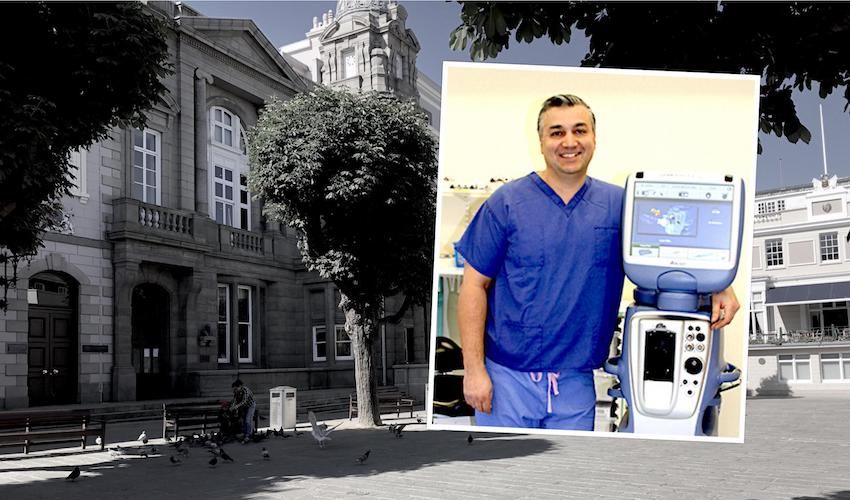

A consultant ophthalmologist who was sacked shortly before starting work in Jersey has won his case against the States, with the court ruling that the dismissal decision was "invalid" and that he may entitled to significant compensation for loss of employment.
Jersey-born Dr Amar Alwitry was offered a post as a consultant in ophthalmology, but was told his contract had been terminated shortly before he was due to start in December 2012 - a decision he challenged in Royal Court in October.
The court heard last year that, prior to the termination of his contract, his hospital colleagues had made derogatory comments about him via email.
Royal Court Commissioner Julian Clyde-Smith, who was sitting with Jurats Antony Olsen and Geoffrey Grime, agreed with a previous finding by the States Complaints Board and said that Dr Alwitry had been treated "most unfairly" and was given no opportunity to answer the allegations against him or given any indication that the Hospital was considering terminating his contract before he had even started work. He was also denied an appeal.
They said that "due process matters" and that Dr Alwitry's side of the story should have been heard before his behaviour was described as "atrocious" or "aggressive" or "duplicitous" and dismissing him without notice.
The Court found that the States Employment Board (SEB) had no right to end Dr Alwitry's contact without cause or "for some other substantial reason". They also found that the surgeon had not repudiated his contract, entitling the SEB to terminate it. They therefore concluded that the termination of the doctor's contract was not valid.

Pictured: The Royal Court found that the SEB had no right to terminate Dr Alwitry's contract.
The judgment notes that while the Law Officer's Department advised the SEB their liability would be limited to the notice period of three months, the Court found there was no such restriction. As the SEB's decision to dismiss was invalid, the Court found there was no "notice period to act as a restraint on damages".
"We are not concerned here with the fairness of Mr Alwitry's dismissal, but with its validity, and having found it to be invalid, there is no basis that we can see upon which we can properly restrict damages to the notice period required for a valid dismissal for cause," they wrote.
They therefore concluded that Dr Alwitry can make a compensation claim "for the loss of his employment". They however added that he will not be able to recover "punitive or exemplary damages", as it was out of their jurisdiction. They added that even if they had been able to award such damages they wouldn't have done so, as they found that the hospital management "acted in good faith in the interests of the General Hospital".
The Court concluded that damages should be assessed "on the basis of compensation, not punishment".
Pictured: Dr Alwitry was supposed to start work at the hospital in December 2012.
Dr Alwitry's case was that, even after his dismissal, he was never told what he did wrong, but believed it may have been because he raised issues over patient safety.
However, the States Employment Board (SEB) alleged that he refused to work weekends – something Dr Alwitry denied.
Dr Alwitry challenged his unfair dismissal in the Royal Court last year. Represented by Advocate Steven Chiddicks, Dr Alwitry said he was surprised to have been asked to start his new role within just three-months, given that he needed to give his then employer six months' notice.
After finally agreeing a starting date, Dr Alwitry was sent a working plan which he says led him to have concerns about patient’s safety.
After this, a back-and-forth chain of fraught correspondence between the eye surgeon, hospital staff and the States' HR Department ensued, culminating in Dr Alwitry’s eventual dismissal.

Pictured: Advocate Stephen Chiddicks represented Dr Alwitry during the case.
Dr Alwitry’s legal challenge stretched over two weeks with former SEB Chair and ex-Chief Minister Ian Gorst called into the witness box, the first serving Minister to have given evidence before the court. He denied any hand in the surgeon’s dismissal.
The Solicitor General, Mark Temple, represented the States in the case. He had to defend a series of derogatory emails by hospital staff - including one from the Medical Director suggesting they “sack this bloke before he even gets here”, which Dr Alwitry said was defamatory.
The Solicitor General said these were genuine opinions, based on the fact there had already been a relationship breakdown and loss of trust in the eye surgeon before his dismissal.

Pictured: The Solicitor General, Mark Temple, represented the States in the case.
On the last day of the hearing, the Solicitor General told Court that Dr Alwitry’s sacking was “reasonable”, adding that the eye surgeon’s patient safety concerns had already been addressed at the time of his sacking, describing his whistleblowing claim as a “construct” that had been abused to build a case against the SEB.
What really prompted his sacking, the Solicitor General argued, was his allegedly aggressive, demanding and “wholly inappropriate” correspondence over start dates sent to hospital colleagues, which he said “didn’t bode well” for his future relationship with the team.
Follow Express for updates...
Comments
Comments on this story express the views of the commentator only, not Bailiwick Publishing. We are unable to guarantee the accuracy of any of those comments.